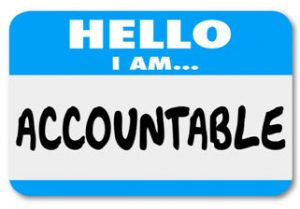It’s easy to chuckle when kids pass the blame without the slightest hint of personal awareness ― “The dog jumped onto the counter and ate all the cookies from the jar!” ― but it is excruciatingly tough to admit that you did something wrong.
without the slightest hint of personal awareness ― “The dog jumped onto the counter and ate all the cookies from the jar!” ― but it is excruciatingly tough to admit that you did something wrong.
Most people would prefer to avoid the potential difficulties of change by ignoring the need for personal accountability altogether. However, personal accountability is beneficial not just for individuals but for society at large: When people take responsibility for their actions, relationships are healthier and communities are stronger because trust and respect flourishes. Accountability is a skill, and as such, it takes time and energy to develop. Fortunately, the benefits of answering for your actions are well worth the effort.
Understand Your Objectives
Accountability helps you accomplish your goals ― if you know what your goals are. As you begin changing your behavior to form a more accountable lifestyle, you must have a clear understanding of what kind of person you hope to be.
At work, to be accountable for your actions, you must know your role within the organization. Usually, your superiors will provide you with specific projects to complete, but you must be aware of your responsibilities so you may take true ownership of them.
 In life, you must imagine a definite lifestyle and construct a concrete plan to achieve it. You might even draft a personal mission statement, such as “To live healthfully and honestly so that my loved ones and I will be happy,” to guide your actions going forward. Then, you can set micro-goals that adhere to that mission statement, such as switching to e-cigarettes or visiting family twice a year. Having personal goals will keep you on track―and help you stay accountable for your actions.
In life, you must imagine a definite lifestyle and construct a concrete plan to achieve it. You might even draft a personal mission statement, such as “To live healthfully and honestly so that my loved ones and I will be happy,” to guide your actions going forward. Then, you can set micro-goals that adhere to that mission statement, such as switching to e-cigarettes or visiting family twice a year. Having personal goals will keep you on track―and help you stay accountable for your actions.
Ask for Help
You don’t know how to do everything, and few people expect you to. However, it is unquestionable that sometime in your life, you will need to complete a task that you don’t understand. Though your first instinct may be to bumble through the assignment on your own, accountability demands you admit your ignorance and seek help. Co-workers, friends, and family are usually more than eager to lend a hand to help you improve, and their instruction will help increase your acquisition of your new skill. Pretending you know how to do something prevents you from being forthright and wastes time and energy; meanwhile, taking accountability for your lack of knowledge will help everyone succeed.
Acknowledge Your Mistakes
At its core, being accountable means assuming responsibility for your actions ― even your erroneous actions. Most people find it difficult to admit to their mistakes, which is why accountable people are so respected at work and in life. To overcome the fear and guilt associated with your wrongs, you should strive to make amends for any past blunders that you remember. A true apology contains four distinct parts:
- A description of the mistake
- An explanation of why it was wrong
- A justification for overcoming the mistake
- A request for forgiveness
You can use this template to express regret for any blunder that affected another person. Of course, you will likely make mistakes that only impact you and your ability to reach your objectives, like binging on junk food or buying a pack of cigarettes. When this occurs, it is still useful to acknowledge your mistakes to another person. The embarrassment of discussing your error will help you stay accountable to your goals.
Write Everything Down
Studies show that writing your notes out improves your ability to remember those notes. Thus, to remember your duties and keep track of your appointments, you should start writing them down. To-do lists, calendars, journals, and more can help keep you more accountable ― as long as you are judicious with their use. Lengthy or poorly organized notes tend to be overwhelming and negate any positive benefits, so you should try to limit your daily tasks to five or fewer. With this system, you will learn the importance of prioritizing, which will keep you accountable for the most important obligations of the day.
Be More Humble
Even as displaying accountability gains you credibility with those around you, it is imperative that you remain humble. In fact, those around you cherish humility nearly as much as accountability. By being kind, staying honest, and keeping your mind on your goals, you will build a better life for yourself ― because you will lead that life accountably.








